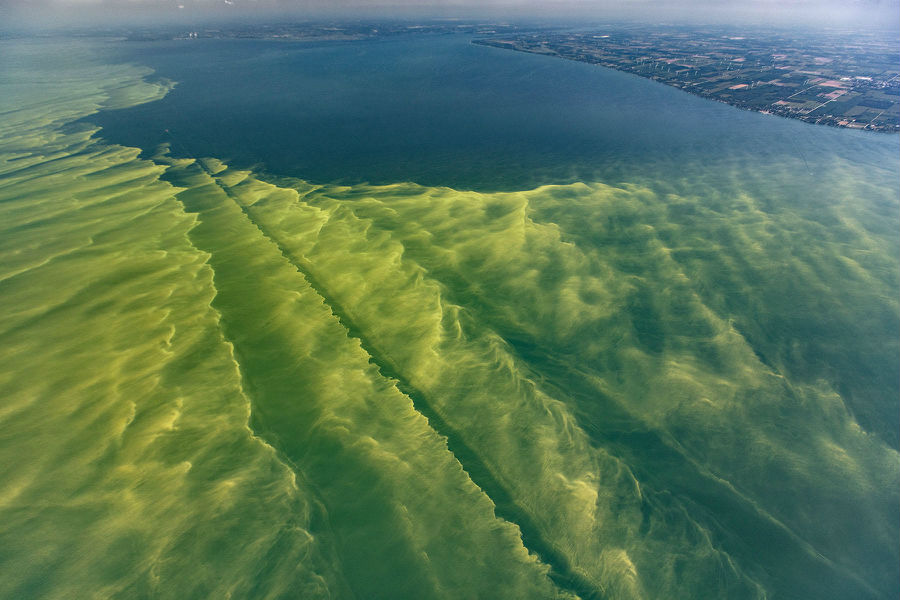In the summer of 2014, a giant algae bloom took over Lake Erie.
2014年夏天,伊利湖出现了大规模的藻华泛滥。
It was so big, you could see it from space.
大到从太空都能看得见。
This algae contained a toxin that could cause vomiting and liver damage.
这种藻华含有一种能引发呕吐和肝部受损的毒素。
"Leaving over half a million people with no safe drinking water."
“50多万人没有了安全的饮用水。”
"Residents have been served notice: stop drinking water. Don't shower. And don't let pets come near tap water."
“居民们接到通知:停止饮水。不要洗澡。不要让宠物靠近自来水。”
A few days later...
几天后……
"Hundreds of thousands of people in Ohio are breathing a sigh of relief today.
“今天,俄亥俄州成千上万人都松了一口气。
The mayor of Toledo announced today the city's water is now safe to drink."
因为托莱多市长今天宣布该市的水可以安全饮用了。”
"It seemed like, oh don't worry, we got over that, the water is safe,
“就好像说,啊,别担心,问题已经解决了,水已经安全了,
we're gonna show video of people drinking tap water just to put you at ease."
我们准备播放喝自来水的视频来让你安心。”
"Here you go, right from the tap...
“准备好了吗,直接从水龙头接的水噢……
And again: It's clean.
这个水,又,清洁了。
The blooms weren't toxic enough to affect the drinking water, but they kept coming back.
那个藻华的毒性并不足以影响我们的饮水安全,但这个问题反复在出现。
That made me really angry,
让我生气的是这个,
that we've just been kind of allowing this problem to go on, we've been watching this ecosystem suffer.
是我们任由了这个问题的发展,是我们眼看着我们的生态系统恶化而不作为。
Why haven't we taken action until now?
为什么我们到现在都没有采取行动?
In February 2019, the citizens of Toledo voted to try something unprecedented.
2019年2月,托莱多的市民们投票准备采取一些打破历史的行动。
"Breaking news tonight, the results are in."
“今晚的大事件,投票结果出来了……”
"The Lake Erie Bill of Rights has passed by a wide margin."
“《伊利湖人权法案》高票通过。”
"Lake Erie has earned some of the same legal rights as humans." "The same rights, as a human being. It happened."
“伊利湖从此赢得了一些与人类同等的法律权利。”“和人一样的权利。传言成真了。”
If you fly over this area west of Lake Erie,
如果你飞到伊利湖以西的这片区域上空,
you'll see mostly corn and soybean fields, but that wasn't always the case.
你看到的很可能是玉米地和大豆地,但情况并非一直是这样。
Up until the late 1800s, it was known as the Great Black Swamp, it was muddy and mosquito infested.
直到19世纪末,这里还是著名的“大黑沼泽”,一片泥泞,而且到处都是蚊子。
Indigenous communities had always just left it alone,
土著社会一直是任何这片沼泽自生自灭,
but when European settlers arrived, they had other ideas.
但欧洲殖民者来了以后有了不同的想法。
They thought "oh wow look at all this great ground we have here."
他们觉得"哇,看看着土地多好啊。"
We need to conquer this land.
我们要征服它。
They drained the swamp.
他们抽干了沼泽地里的水。
First they dug trenches around the fields to siphon off the water,
先是在围着沼泽地挖沟,把沼泽里的水放干,
but the soil beneath was still too wet to grow crops,
但下面的土壤还是太稀,根本种不了庄稼,
so they added these underground tubes with holes in the top.
他们便又在沼泽地地下埋了这些顶部有洞的管道。

Water from the swampy soil traveled through the tubes into the ditches,
沼泽淤泥里的水可以通过管道流入沟渠,
where it flowed into creeks and rivers and eventually Lake Erie.
再流入小溪和河流,最终汇入伊利湖。
The soil could support crops and livestock, which is why we need to talk about cow shit.
现在,沼泽里的土壤已经可以承受庄稼和牲畜了,现在,我们得来谈谈牛粪了。
Each cow in a herd needs an acre of grass. That's nearly a football field.
牛群中的每头牛都要吃一英亩,也就是差不多一个足球场那么多的草。
So these early farms tended to have small herds on huge swaths of land.
所以这些早期的农场倾向于在大片土地上养一小群牛。
The whole idea is to sort of emulate the bison in olden days.
差不多整个就是在模仿过去的野牛放牧的形式。
They didn't have to do anything with the waste.
他们也不需要处理牛粪。
It slowly fertilized the soil and grew more grass.
因为牛粪能够给土地施肥,让沼泽地长出更多的草。
In the mid 20th century that started to change.
到了20世纪中期,情况开始发生变化了。
Economists came up with a notion that if we got a lot of animals together,
经济学家提出了一个想法:把牛群扩大的话,
then they could grow livestock in a very rapid manner.
饲养牛群的速度就能变得更快。
The equation had flipped — instead of a small herd of cows spread out over a large area,
这样一来,等式就颠倒过来了——不再是将一小群牛分散在一大片土地上,
today thousands of cows share a very small space.
而是让成千上万头牛都挤在一个非常小的空间里。
The same is true for pigs and chickens.
饲养猪和鸡也一样。
These operations are known as centralized animal feeding operations, or CAFOs.
这些操作被称为“集中动物饲养操作”(简称CAFOs)。
It was efficient and meat got cheap,
这种饲养动物的新方法效率高了,肉也便宜了,
but this new way of raising animals created a problem: What to do with all that waste?
但也产生了一个问题:那么多的粪便怎么处理?
It's normally stored in large, what are called lagoons.
常规的做法是把它们堆积在很大的,所谓的“潟湖”里。
The waste is mixed with water and eventually these lagoons fill up,
那些粪便与水混合,迟早会将那些潟湖填满,
so the CAFOs will have it hauled and spread out over nearby corn and soybean fields.
这样一来,CAFOs就只能把多余的粪便运到附近的玉米地和大豆地里。
Unlike solid manure, nutrients from this liquid mixture can travel quickly through those same tubes that keep the soil dry
与固体肥料不同的是,这种液体混合物中的营养物质可以通过初衷是使土壤保持干燥的那些管道快速流动,
and into the waterways that eventually feed Lake Erie,
进入最终成为伊利湖水源的水域,
where the phosphorus from the manure combines with warm shallow water, to create an ideal home for toxic algae.
粪便中的磷与温暖的浅水结合,就会为有毒藻类创造理想的繁殖家园。
There are nearly 150 centralized animal feeding operations in the Western Lake Erie Basin.
伊利湖盆地以西有近150个集中动物饲养作业基地。
Each year, they produce nearly 700 million gallons of manure.
每年,这些基地产生的粪便将近7亿加仑(约265万立方米)。











